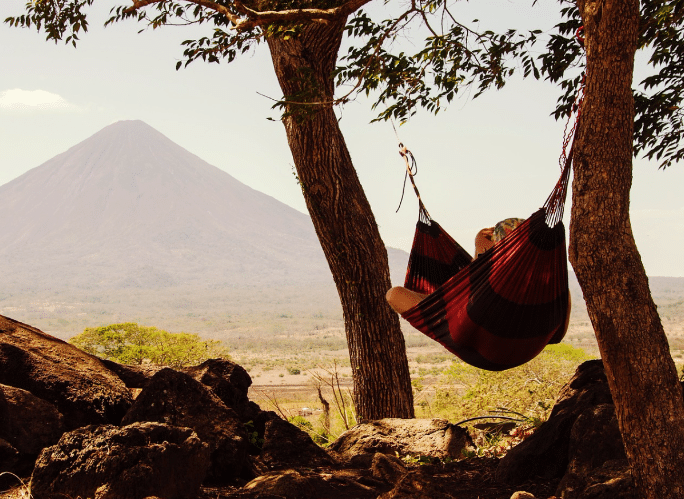
Do you ever have the feeling that in order to live more sustainably you have to make lots of sacrifices? That you have to give up on those things that actually bring joy, comfort and pleasure to your life?
Living lightly and feeling good
You might want to think twice. Research shows that people who live lightly on this planet tend to be happier in their lives. Thus, contrary to what we often feel, fulfilling our own needs does not need to come at the cost of other people or the planet. It’s therefore worth exploring what we need to bring more joy and wellbeing into our lives.
The fear of missing out
The picture used for this blog might be deceiving. It might make you feel that in order to be as happy and relaxed as the woman on the picture seems to be, you have to catch a plane to some far away sunny destination and put up your hammock. It may even give you the so called ‘fear of missing out’.
What about the here and now?
Try a little exercise then. Look at this picture and replace these potential feelings of jealousy, restlessness or rush with inhaling the calmness and joy this picture holds. Breathe in and out and feel how you relax by looking at such a relaxing image. Now realize that this kind of calmness and joy you can also find here and now; on a bench just outside your office, in your garden, by gazing out of the window, taking a little walk orby fully enjoying your cup of coffee or tea.
A conscious pursuit for wellbeing and happiness
I’m not advocating here to stop travelling. I believe travelling can be a life enriching experience and can create more understanding between people and cultures. I do, however, advocate for being conscious about our pursuit for wellbeing and happiness. To learn that very often we might actually need less – less activities, less experiences, less stuff, less information and perhaps less travelling – to create more space for simple joy and wellbeing.
Further reading and references:
Alexander, S. 2011. “The Voluntary Simplicity Movement: Reimagining the Good Life beyond Consumer Culture.”
Belton, T. 2014. Happier People Healthier Planet: How Putting Wellbeing First Would Help Sustain Life on Earth. Bristol: Silverwood Books.
Brown, KW and T. Kasser. 2005. “Are Psychological and Ecological Well-Being Compatible? The Role of Values, Mindfulness, and Lifestyle.” Social Indicators Research.
Kasser, Tim. 2009. “Psychological Need Satisfaction, Personal Well-Being, and Ecological Sustainability.” Ecopsychology 1(4):175–80.
O’Brien, Catherine and Catherine. 2008. “Sustainable Happiness: How Happiness Studies Can Contribute to a More Sustainable Future.” Canadian Psychology/Psychologie canadienne 49(4):289–95.
Pluta, Aislinn. 2012. Integrated Well-Being: Positive Psychology and the Natural World Integrated Well-Being: Positive Psychology and the Natural World.
